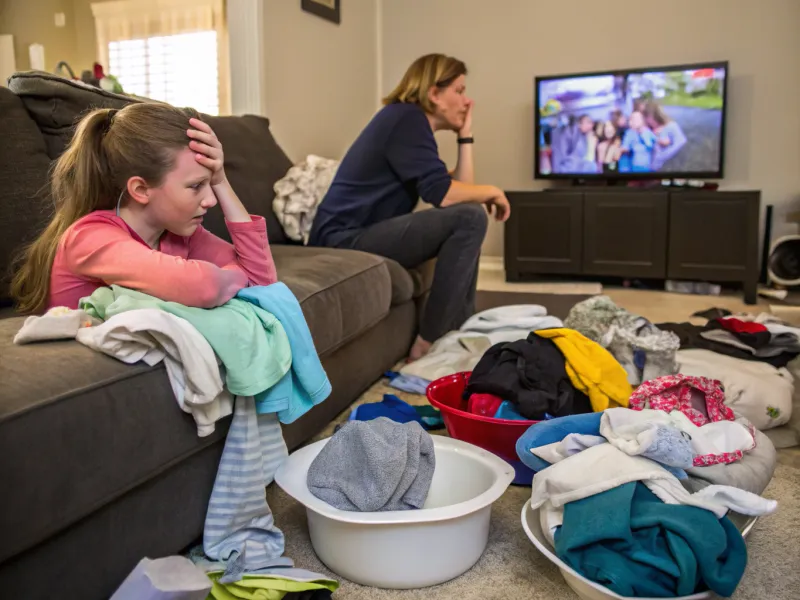29 Ways Parents Accidentally Enable Their Grown Kids’ Worst Behavior
Hey there! Today, we’re exploring a topic that might just hit a little too close to home. It’s all about those loving, well-intentioned things we parents sometimes do that inadvertently give our grown-up kids a free pass to keep acting like they’re still in high school. We’ve all been there, right?
So, let’s talk about 29 things we might be doing that are secretly enabling our adult children’s not-so-adorable behaviors. And hey, don’t worry—we’re all in this together!
1. Bailing Them Out Financially

Money talks, my friend, and sometimes it says way too much. You know the drill: your adult kid calls, and somehow, their bank account has taken a nosedive. What’s a parent to do? We swoop in like financial superheroes, credit card in hand, ready to save the day.
But here’s the kicker: when we constantly bail them out, they never learn to paddle their own canoe. Instead of fuming quietly, maybe it’s time for a heart-to-heart about budgeting. Trust me, it’s not as scary as it sounds.
Next time they dial you up with a financial SOS, resist the urge to reach for your wallet. Encourage them to find a solution instead—they might just surprise you. It’s all about balance, right? Let’s give them a chance to stand on their own two feet while we cheer them on from the sidelines.
2. Avoiding Tough Conversations

Ah, the classic avoidance dance. It’s like walking on eggshells, but with more eye-rolling. We shy away from those hard conversations because, let’s face it, nobody enjoys confrontation. But avoiding these talks? It’s like sweeping dirt under the rug—eventually, it’s going to trip someone up.
If we never address the elephant in the room, it turns into a moody mammoth. Yes, those discussions can get awkward, but they’re necessary. Your adult child isn’t a mind reader, after all.
So, what’s the plan? Next time something’s bugging you, take a deep breath and put it out there. It’s not about winning a debate; it’s about clearing the air. Who knows? You might even get a chuckle out of it by the end.
3. Giving a Free Pass for Disrespect

Ever found yourself chuckling off a disrespectful remark just to keep the peace? You’re not alone. Sometimes, it feels easier to let the eye-rolling and sarcasm slide. But hey, let’s be real—it’s a slippery slope.
When we give them a free pass, we’re silently saying it’s okay to treat others poorly. Yikes! Time to flip the script and set some boundaries. Respect is a two-way street, and it’s high time we both drive on it.
Next time sass rears its head, try having a calm chat about mutual respect. It might feel awkward at first, but it’s a conversation worth having. Remember: setting standards isn’t about creating tension; it’s about fostering a healthier relationship.
4. Playing the Blame Game

Oh, the blame game—a tale as old as time. We find every scapegoat under the sun to excuse our child’s behavior. It’s the weather, the boss, or even Mercury in retrograde. But deep down, we know this finger-pointing doesn’t fix a thing.
By deflecting blame, we strip them of accountability. And let me tell you, accountability is the secret sauce for adulting. It’s time to trade the blame game for some honest-to-goodness responsibility.
Next time the urge to point fingers arises, pause, and reflect. Encourage your child to own up to their actions and learn from them. It’s a tough love lesson, but boy, is it worth it in the end.
5. Over-Complimenting Mediocre Achievements

Everyone loves a pat on the back, am I right? But when we shower our adult kids with praise for every tiny thing, we’re setting them up for a reality check. Not every move they make is groundbreaking, and that’s okay!
Over-complimenting can inflate their ego to hot-air-balloon levels. Instead, let’s sprinkle our praise a little more sparingly and save it for the milestones that truly deserve a cheer.
Next time they do something worth noting, by all means, clap away! But if it’s merely passable, maybe a nod and a smile will suffice. Encouragement is fantastic, but let’s not overdo it—it’s about keeping things real.
6. Acting as Their Personal Assistant

When did we sign up to be personal assistants? Somehow, we find ourselves juggling their schedules, emails, and even laundry. It’s like we’ve added another job title to our resumes, unpaid and unappreciated.
By managing every detail, we rob them of the chance to stand up and handle their own affairs. It’s tempting to be the safety net, but it’s time for them to learn the art of adult juggling.
So, what’s the game plan? Slowly hand over the reins of responsibility. Sure, they might drop the ball a few times, but that’s part of the learning curve. Let’s step back and let them take center stage in their own lives.
7. Sweeping Mistakes Under the Rug

Mistakes, mistakes, mistakes. We all make them, but when we sweep them away for our kids, we miss out on golden teaching moments. It’s like covering up a plot twist in their life story.
When we hide their hiccups, they miss the chance to reflect and grow from them. Life’s lessons are often tucked away in those blunders, ready to be discovered.
Next time they stumble, resist the urge to tidy up after them. Instead, encourage a little self-cleaning. Mistakes are life’s teachers, after all. Let’s give them the opportunity to learn the hard way, just like we did.
8. Tolerating Irresponsibility

Ever caught yourself turning a blind eye to their irresponsibility? Maybe the sink’s full of dishes, and their laundry pile is climbing Mount Everest. It’s easy to let it slide, but tolerating this chaos doesn’t do them any favors.
When we excuse their laziness, we inadvertently condone a lifestyle devoid of responsibility. Yikes! Time to swap blind tolerance for gentle nudges towards accountability.
Next time you spot some irresponsibility, point it out and encourage them to take action. Sure, it might feel like nagging, but it’s really about nudging them towards independence. Let’s guide them gently but firmly into accountability.
9. Making Excuses for Their Behavior

We’ve all been there: defending our child’s behavior to others. It’s tempting to play the role of protective lawyer, but constantly making excuses only shields them from growth.
When we excuse their actions, they skip the crucial step of reflection. Let’s face it, growth thrives on honest self-assessment. Without it, they remain in a loop of repetitive mistakes.
Next time you find yourself in defense mode, hit pause. Encourage them to face the music and learn from their missteps. It’s a tough pill to swallow, but it’s part of their journey to becoming responsible adults.
10. Being Their Emotional Crutch

Ah, emotional support—the comforting hug we all need sometimes. But when we become their perpetual emotional crutch, we risk stunting their emotional growth.
We love them dearly, but constantly cushioning their emotional falls doesn’t teach resilience. It’s a delicate dance between being there and letting them find their emotional footing.
Next time they stumble over life’s hurdles, offer support, but encourage self-reflection and problem-solving too. Let’s be their cheerleaders without being their crutches. It’s all about balance, my friend.
11. Ignoring Red Flags

Oh, those pesky red flags—they’re hard to miss but even harder to confront. Sometimes, we turn a blind eye because, let’s be real, it’s easier than facing the uncomfortable truth.
But when we ignore warning signs, we enable them to persist unchecked. It’s like letting a small leak turn into a flood. Ignoring issues doesn’t make them disappear; it often makes them grow.
Next time a red flag waves in your face, muster the courage to address it. It might be difficult, but confronting it early can prevent a bigger mess down the road. Let’s not shy away from the tough stuff.
12. Living in Denial

Denial, oh sweet denial—it’s like a cozy blanket that shields us from reality. We sometimes put on those rose-colored glasses and hope for the best. But living in denial? It doesn’t change a thing.
When we refuse to see the truth, we miss the opportunity to help them change. It’s time to face the music and support them in making better choices.
Next time denial rears its head, take a deep breath and remove those glasses. Address the issue head-on and work together on finding a solution. It’s not easy, but it’s the first step towards positive change.
13. Being Overly Protective

Being protective is second nature, but when it turns into overprotectiveness, it’s like building a bubble around them. Sure, it keeps them safe, but it also stifles their growth.
When we hover too closely, they miss out on learning from real-life experiences. It’s time to let go a little and trust them to navigate the world.
Next time you feel the urge to shield them from everything, take a step back. Encourage exploration and independence. It’s scary, but it’s also essential for their personal development.
14. Not Allowing Consequences

Consequences are life’s way of teaching lessons, but when we shield our kids from them, we deny them valuable learning experiences.
By stepping in, we rob them of the chance to learn from their actions. It’s tough, but allowing them to face consequences is a gift in disguise.
Next time you’re tempted to intervene, pause and let the dominoes fall. Trust that they’ll learn and grow stronger from it. It’s all part of the journey to adulthood.
15. Avoiding Setting Boundaries

Boundaries are like invisible fences—they protect us and guide them. But when we avoid setting them, we open the door to chaos.
Without boundaries, they might take advantage of our kindness, leaving us feeling drained and unappreciated. It’s time to draw the line and reclaim our space.
Next time you feel your boundaries slipping, stand firm and set them clearly. It’s not about being harsh; it’s about mutual respect and maintaining a healthy relationship.
16. Taking Over Responsibilities

Somehow, we end up carrying their loads along with our own. Taking over their responsibilities might seem helpful, but it sends the wrong message.
By doing everything for them, we teach them to rely on us instead of themselves. It’s time to hand back the reins and encourage self-sufficiency.
Next time you find yourself stepping in, take a step back. Encourage them to take charge and handle their responsibilities. It’s empowering for them and freeing for us.
17. Constantly Checking On Them

Checking in is sweet, but constantly hovering? That’s a recipe for dependency. It’s like being on call 24/7, leaving us anxious and them overly reliant.
When we over-check, we send the message that they can’t manage without us. It’s time to loosen the leash a little and trust them to handle things.
Next time you feel the urge to check, resist and give it time. Trust that they’re capable of navigating life on their own. It’s liberating for both sides.
18. Letting Them Live Rent-Free

Home is where the heart is, but it’s also where they might overstay their welcome. Letting them live rent-free sends the message that they don’t have to contribute.
By not paying their way, they miss out on understanding the value of money and responsibility. It’s time to have a candid chat about sharing the load.
Next time the subject arises, discuss options for contributing, financially or otherwise. It’s about building responsibility and preparing them for the real world.
19. Overindulging Their Wants

We love to spoil them, but constantly giving in to their whims? That’s a slippery slope. Overindulging turns wants into needs, skewing their understanding of scarcity.
By meeting every desire, we set unrealistic expectations. It’s time to distinguish between wants and needs, teaching them the art of moderation.
Next time they ask, weigh the necessity and consider saying no. It might be tough, but it’s crucial for their growth and understanding of value.
20. Encouraging Dependency

We want to be their rock, but if we encourage dependency, we become their crutch. Constantly holding them up stifles their ability to rely on themselves.
By fostering independence, we empower them to stand on their own two feet. It’s time to promote self-reliance and resilience.
Next time they lean too heavily, gently push them towards independence. Encourage self-sufficiency and confidence. It’s a journey worth taking.
21. Avoiding Conflict

Smooth sailing is nice, but avoiding all conflict can create a storm. It’s like walking on eggshells, never addressing the real issues.
By sidestepping conflict, we miss opportunities for growth and resolution. It’s time to embrace healthy disagreements and open communication.
Next time tension arises, face it head-on with calm and clarity. It’s not about arguing; it’s about finding common ground and understanding. Let’s break the silence.
22. Overplanning Their Lives

We love a good plan, but overplanning their lives? That’s a recipe for rebellion. It’s like mapping their every move, leaving no room for spontaneity.
By controlling their schedule, we stifle their independence and creativity. It’s time to let go and allow them to navigate their path.
Next time you reach for the planner, take a pause. Encourage them to make their own plans and decisions. It’s about trusting their judgment.
23. Being a Helicopter Parent

Hover, hover, hover—that’s the life of a helicopter parent. Always swooping in to save the day, we might just prevent them from learning crucial lessons.
By being constantly present, we inhibit their ability to handle challenges independently. It’s time to land the chopper and give them space to grow.
Next time you feel the urge to intervene, step back and let them figure it out. It’s about fostering independence and resilience.
24. Ignoring Their Mental Health

Mental health is crucial, but sometimes we overlook its importance. Ignoring their struggles doesn’t make them disappear; it often makes things worse.
By neglecting their mental health, we miss the chance to support them in seeking help and finding balance. It’s time to break the stigma and open the conversation.
Next time you notice signs, address them with care and empathy. Encourage seeking professional help if needed. It’s about supporting them holistically.
25. Taking Sides in Their Conflicts

When conflicts arise, taking sides can exacerbate the situation. It’s like pouring fuel on a fire instead of dousing it with understanding.
By choosing sides, we create division instead of fostering resolution. It’s time to be the mediator, not the judge.
Next time a conflict arises, remain neutral and encourage open dialogue. It’s about fostering empathy and understanding from all sides.
26. Micromanaging Their Decisions

Micromanaging feels like control, but it’s really a leash. By overseeing their every move, we rob them of autonomy and decision-making skills.
When we micromanage, we send the message that they can’t be trusted to make their own choices. It’s time to cut the strings and let them lead.
Next time you feel the urge to step in, take a breath and step back. Encourage independent thought and decision-making. It’s about building confidence and trust.
27. Constantly Rescuing Them from Consequences

Rescuing adult children from the consequences of their actions hinders their ability to learn from mistakes. When parents consistently step in to fix problems, it prevents the development of problem-solving skills.
Allowing adult children to experience the natural outcomes of their choices teaches resilience and responsibility. Parents can offer guidance but should refrain from taking over the resolution of their children’s problems, as this fosters independence and maturity.
28. Covering Up for Them

Ah, the cover-up—so tempting, right? Maybe you told a little fib to Grandma about why your adult kid didn’t make it to brunch, or you “forgot” to mention that missed job interview. We do it to protect them—but covering up bad behavior just fuels the cycle.
When we shield them from the consequences or embarrassment, they never feel the need to step up. Let’s trade cover-ups for some tough truths and let them own their story. Next time you’re tempted to smooth things over, take a step back and let them handle the fallout. Growth starts where excuses end—and that’s a gift, not a punishment.
29. Ignoring Your Own Needs

Here’s a big one: putting yourself dead last. You bend, stretch, rearrange your entire schedule to cater to their needs—and where does that leave you? Tired, tapped out, and wondering when you’ll catch a break.
By constantly sidelining your own needs, you’re not only running on empty but teaching them that your time and energy are infinite. Spoiler: it’s not. Next time they ask for something that’ll stretch you thin, ask yourself, “What do I need right now?” Because your well-being matters too. Setting that example? That’s called empowered parenting.







